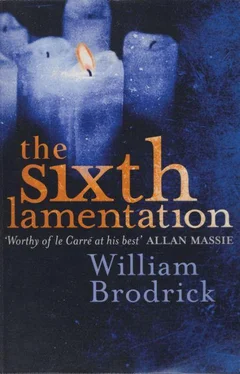William Brodrick - The Sixth Lamentation
Здесь есть возможность читать онлайн «William Brodrick - The Sixth Lamentation» весь текст электронной книги совершенно бесплатно (целиком полную версию без сокращений). В некоторых случаях можно слушать аудио, скачать через торрент в формате fb2 и присутствует краткое содержание. Жанр: Триллер, на английском языке. Описание произведения, (предисловие) а так же отзывы посетителей доступны на портале библиотеки ЛибКат.
- Название:The Sixth Lamentation
- Автор:
- Жанр:
- Год:неизвестен
- ISBN:нет данных
- Рейтинг книги:5 / 5. Голосов: 1
-
Избранное:Добавить в избранное
- Отзывы:
-
Ваша оценка:
- 100
- 1
- 2
- 3
- 4
- 5
The Sixth Lamentation: краткое содержание, описание и аннотация
Предлагаем к чтению аннотацию, описание, краткое содержание или предисловие (зависит от того, что написал сам автор книги «The Sixth Lamentation»). Если вы не нашли необходимую информацию о книге — напишите в комментариях, мы постараемся отыскать её.
The Sixth Lamentation — читать онлайн бесплатно полную книгу (весь текст) целиком
Ниже представлен текст книги, разбитый по страницам. Система сохранения места последней прочитанной страницы, позволяет с удобством читать онлайн бесплатно книгу «The Sixth Lamentation», без необходимости каждый раз заново искать на чём Вы остановились. Поставьте закладку, и сможете в любой момент перейти на страницу, на которой закончили чтение.
Интервал:
Закладка:
‘I did.’
‘That’s not what happened in the courtroom.’
‘I know’
‘Father, don’t you think your meddling has done enough damage? There’s a chance that rubbish from Victor Brionne could lead to an acquittal. Are you aware of that?’
Anselm blazed with humiliation. ‘I promise, I had no idea what he was going to say.
‘Your promises are not entirely straightforward, I’m afraid.’
‘But this time I know what I’m doing. Before I was in the dark.’
‘As was I, and still am. I don’t want to be enlightened. Here’s the address and telephone number.’ She handed him a piece of paper. It had been written down in advance.
‘Thank you.
‘Father, I’m sorry to say this but I’m giving it to you not because I trust you, but because it’s a matter of public record. He’s in the telephone book.’
Anselm put the note in his pocket, his head bent, unable to face his accuser. When he finally did so, DI Armstrong had already turned around. He stood, emptied, watching her walk down the steps away from him.
5
Anselm returned to St Catherine’s and rang Victor Brionne.
‘I think we ought to have another talk.’
‘Why? As a result of our last conversation, I came to the court. Now, after my performance, I have lost my son. I don’t think you and I have anything else to say to one another.’
‘I want to talk about Agnes Aubret.’
‘What’s the point? Your curiosity has too high a price.’
‘She’s alive.’
‘No, she’s not,’ he barked. ‘I should know.’
‘Victor, I know her granddaughter. Agnes survived. She is here in London. I will be seeing her within the next few days with a message from Mr Snyman.’
The line went deathly quiet. Anselm could hear the intake of breath.
‘Snyman?’
‘Yes. Victor, listen to me. Agnes is seriously ill. She will soon die. Now is the time to let out what you’ve kept back for fifty years.
Chapter Forty-Two
1
The jury reconvened at 9.30 a.m. on the Friday. Throughout the passing hours Lucy and Mr Lachaise sat on the bench as if awaiting the ministrations of a dentist. By way of distraction Lucy described the miniature glories of the Duchess who, at that moment, was probably holding her own court in Chiswick Mall. Lucy had parked the old girl there in anticipation of the verdict… a verdict Lucy would probably bring to Agnes that evening. No decision had been reached by lunchtime. Lucy walked the streets. She kept moving, tiring her limbs, until it was time to get back to the Old Bailey.
At 2.30 p.m. the jury indicated through the usher that they had a question. Counsel, solicitors and the Defendant were called into court. Mr Justice Pollbrook came on to the bench. The jury were summoned. The foreman passed a note to the usher who gave it to the judge. He opened a sheet of paper, read it and handed it down to Counsel. The note was passed back to the judge who read it out loud:
‘We would like to hear some evidence from the person who took the child saved by the Defendant. Can this be arranged?’
Turning to the jury, Mr Justice Pollbrook said, ‘Ladies and gentlemen, you must not allow yourselves to be distracted by speculation upon evidence that might have been presented to you. Your task is simply this: to decide the case on the evidence you have heard and nothing else.’
As everyone traipsed out Lucy turned to Mr Lachaise and said, ‘They’ve decided he saved a child and they think it matters.’
‘Like I said, pity is a sticky sweet,’ he replied. ‘I’ve tasted it myself.’
2
Anselm stood facing the home of Victor Brionne. Through the window he could only see books, from floor to ceiling on every wall. He knocked on the door. It opened. A rounded back split by braces receded. Anselm stepped in, along a dark corridor. A small square of greasy daylight hung suspended at the top of the stairs, behind a half-closed toilet door.
‘Take a seat,’ said Victor Brionne, pointing.
They sat in worn, charity shop chairs. A faded burgundy carpet lay in rucks, its pattern now barely distinguishable. Anselm’s eye caught the glint of glass, from a wine bottle, standing close to Victor’s chair like a furtive intruder. Anselm’s keys bit into his thigh. He fished them out and put them on the armrest.
‘If Agnes survived, it’s a miracle,’ Brionne said.
‘She survived.’
Brionne ran a finger along one of the deep creases spreading beneath his large dark eyes. Quietly astonished, he said to himself, ‘If only I had known… all these years…’
‘What difference does it make?’ asked Anselm.
‘What difference?’ Brionne laughed, pulling out a cigarette from a crumpled packet. He struck a match. The flame hissed, lit his face and died. ‘I was there when Rochet asked us to be knights of a Round Table of forgotten chivalry, and they all said, “Yes, yes, bring us our bows of burning gold, our arrows of desire, our shields…”’ He stopped, trying to make out lost faces in the middle distance. ‘Except for me. I asked why.’ He turned to Anselm. ‘I could not see the poetry in self-destruction.’ Blue smoke swirled over his face.
‘I went to see Rochet after the first round-up. He said it was just the beginning. Soon, they’d all be swept away It would be a Babylon the like of which the world had never seen. There would be no weeping by any rivers, no Exodus. I don’t know what came over me. I said I’d join the police.’
Anselm felt heat in a room with no fire.
‘They’d carried out the arrests, so where better place to go? We’d know in advance what the Germans were up to.’
‘What?’ exclaimed Anselm.
Brionne seemed not to hear. ‘Why did I do it? I didn’t think about it at the time, but it was for Agnes: He drew deeply on his cigarette. ‘I had entertained what nineteenth-century novelists call “hopes”. They were dashed in nineteenth-century fashion when I learned she was carrying Jacques’ child. She told me a few months before I went to see Rochet. Somehow the two are linked: the end of my great expectations and me doing something that I knew would command her undying admiration, if ever she found out. There was a poetic symmetry in the self-sacrifice.’
Brionne got up and walked out of the room. He came back with a small, foxed black and white photograph with creased corners. He handed it to Anselm.
‘That’s her. I took it in 1936.’
She had long, straight hair, and had been caught in time as she threw the lot over her shoulder. In the shadow beneath, her mouth was slightly open, her eyes creased with… what was it? Self-consciousness, confidence, suppressed exhilaration… it was all of them and more, the gifts that come just before the parting of youth. Behind stood a young man, serious, his gaze fixed on Agnes… possessive, and wanting to be possessed.
‘That’s Jacques.’ Brionne held out his hand for the photograph. ‘So I joined up and got transferred to Avenue Foch, because of my German. At the time I thought it was the hand of God. Now? I’m not so sure. That was where I met Schwermann.’
Brionne dragged the bottle a few inches across the carpet, into better reach, and poured wine into a stained mug.
‘He was ordinary to look at. The evil ran through his mind. He poisoned himself with pseudo-scientific pamphlets against the Jews. He underlined phrases and ticked margins: He drank, the cigarette locked between two fingers. ‘Anyway Rochet decided he would be my sole contact. My code name was “Bedivere”, and it was known only to him and the Prior of Les Moineaux and his council. If I needed to run, they’d protect me. So, there I was, at the heart of things. I hadn’t been there long when “Spring Wind” was planned, though nothing had been worked out for the children. I told Rochet.’ Brionne grimaced. ‘So many could have been saved if we hadn’t been betrayed.’
Читать дальшеИнтервал:
Закладка:
Похожие книги на «The Sixth Lamentation»
Представляем Вашему вниманию похожие книги на «The Sixth Lamentation» списком для выбора. Мы отобрали схожую по названию и смыслу литературу в надежде предоставить читателям больше вариантов отыскать новые, интересные, ещё непрочитанные произведения.
Обсуждение, отзывы о книге «The Sixth Lamentation» и просто собственные мнения читателей. Оставьте ваши комментарии, напишите, что Вы думаете о произведении, его смысле или главных героях. Укажите что конкретно понравилось, а что нет, и почему Вы так считаете.












